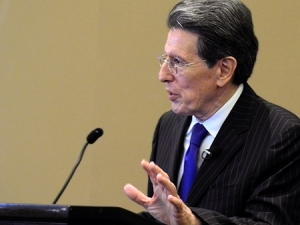Vega Speaks at First Immigrant Health Initiative Seminar
October 05, 2011 / by Vincent Lim- Research
William Vega, provost professor and executive director of the Edward R. Roybal Institute on Aging at the USC School of Social Work, delivered the inaugural lecture for the Immigrant Health Initiative (iHi) seminar series on Sept. 29 at Ronald Tutor Campus Center.
Vega is one of the nation’s leading experts on health disparities that affect aging ethnic minority populations and a founding member of the initiative, which received a $25,000 annual grant for up to three years from the USC Collaboration Fund. Lihua Lui, an assistant professor in the Department of Preventive Medicine at the Keck School of Medicine of USC, is spearheading the new public health initiative to engage faculty and students in an ongoing dialogue about why the positive health characteristics of many immigrants to the United States deteriorate soon after their arrival and what can be done to reverse the trend.
“They’re coming here as fairly healthy people,” Vega said. “When you travel in countries abroad, you will quickly notice that they look different than the American population.”
The U.S. Latino population, which is around 50 percent foreign-born, is a telling example. Vega noted this Latino population has a lower overall mortality rate than the rest of the U.S. population because it comprises a large number of immigrants. He added that American-born Latinos have more chronic health problems than foreign-born Latinos.
One reason for the deteriorating health of immigrants is the adoption of certain American lifestyle behaviors.
“[Immigrants] do not have all of these habits that we develop around substance abuse excesses, smoking and overeating,” Vega said. “We have some of the highest rates of depression and highest rates of total mental health problems and highest rates of substance abuse in the world.”
Immigrants’ exceptional health also begins to decline as they struggle to acculturate to American society and must confront systemic inequalities due to their immigrant status.
“Immigrants who come here strong will over time be weakened by adverse conditions that they will face,” Vega said.
Around 12 percent of the U.S. population is foreign-born. Nearly half of all foreign-born in the United States are Latino. One-quarter of the nation’s foreign-born population is from Asia.
A significant percentage of the foreign-born U.S. population is lower socioeconomic status.
“Social status differences make a massive difference in biological effects on the body,” Vega said.
The long-term cumulative effects of lower socioeconomic status become evident as individuals age.
“A 55-year-old from low-income status looks like someone about 70 years old from upper-middle income status,” Vega said.
The focus of his work is to remedy these disparities that exist.
The Roybal Institute, which Vega directs, is dedicated to translational research and training that promotes and sustains optimal physical, mental and social functioning of older persons from low-income and multiethnic backgrounds.
To reference the work of our faculty online, we ask that you directly quote their work where possible and attribute it to "FACULTY NAME, a professor in the USC Suzanne Dworak-Peck School of Social Work” (LINK: https://dworakpeck.usc.edu)
